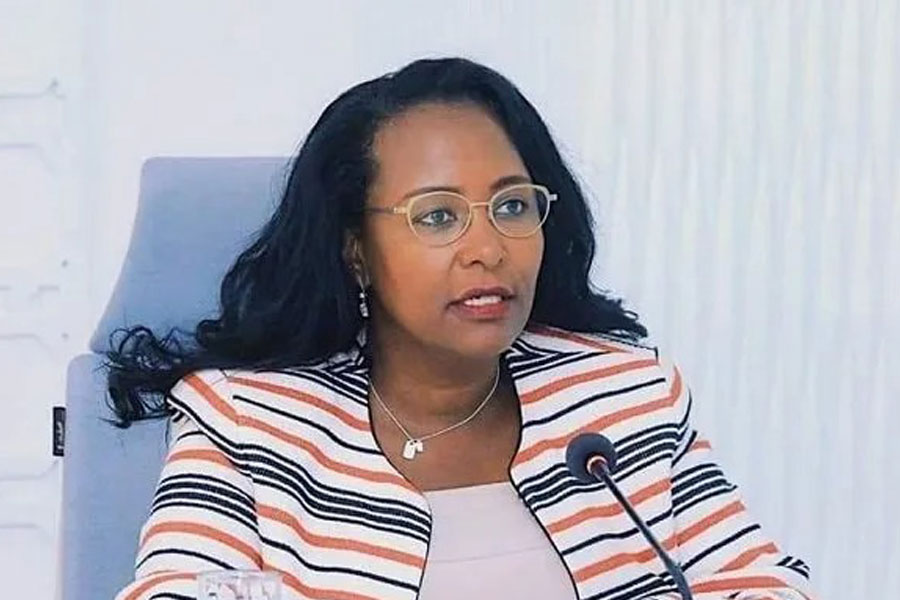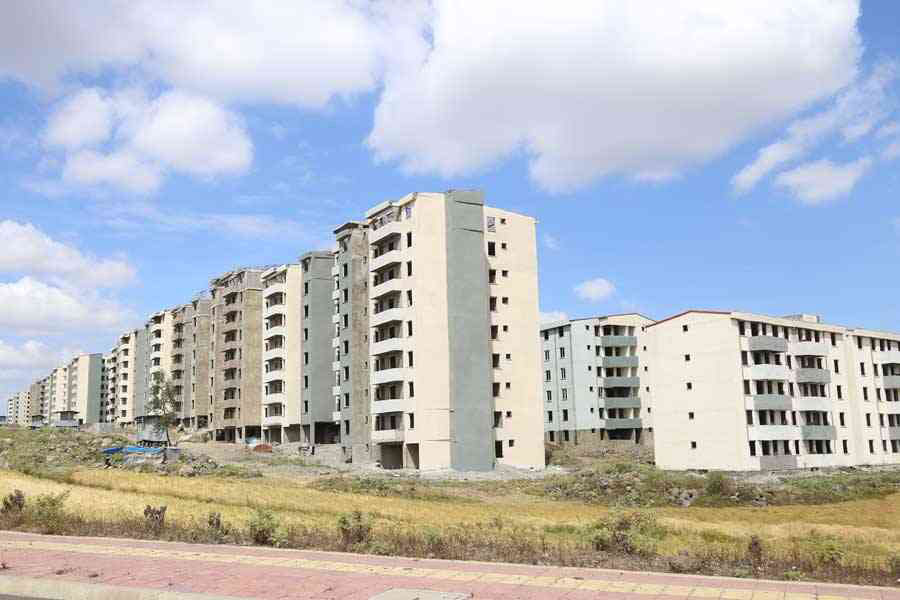
Fortune News | Feb 04,2023
Trapped in a cycle of relentless torment, Meseret Abera 's life has been turned upside down since the ominous notice of eviction arrived four years ago.
Despite her graduate degree and two decades of dedicated service at a public office in Addis Abeba, her meagre monthly income of 7,250 Br offers her few housing options.
With a heavy heart, she is left with the daunting task of finding a place to call home, her gaze fixed on a 6,000 Br rental in the Tulu Dimtu area. As her choices dwindle, she reluctantly considers relocating to the Koye Feche district, a region notorious for lacking essential utilities like water and electricity, a sacrifice she is willing to make to secure a roof over her head.
"I would work for free if housing was provided," she told Fortune.
Meseret collects any form of money available from her siblings to cover expenses for her six-year-old daughter. Albeit remaining unlucky in the lottery draw for condominium houses, she has managed to save 400 Br monthly to benefit from the city's 80-20 subsidised housing scheme for the past 11 years.
"I am losing faith," Meseret lamented to Fortune, her voice echoing the despair of many Addis Abeba residents struggling with the city's housing crisis.
The relentless surge in housing costs has become a source of immense anxiety for many Addis Abebans. Tenants struggle to keep up with the ever-increasing rental fees. At the same time, homeowners grapple with the rising cost of construction materials, protracted access to finance, and the limited availability of land. These factors have created a formidable barrier for even middle-income earners to achieve the dream of homeownership.
In an attempt to address the situation, city officials implemented a policy prohibiting homeowners from increasing rental fees for the past year. However, this measure proved to be a mere band-aid on a gaping wound, failing to address the underlying causes of the housing crisis.
Efforts to alleviate the housing shortage began two decades ago when the government initiated a subsidised condominium project overseen by the Housing Development Bureau.
To date, 317,000 condominium houses out of the 321,089 have been transferred to homeowners by the City Housing Corporation, including the 25,733 individuals in the latest lottery draw. Parallel campaigns, including providing homes to public officials and children of farmers displaced by public projects, were conducted outside the lottery draw, accounting for the discrepancy.
The Corporation tasked to construct and transfer the houses to owners has a six billion Birr budget for the year. With the last registration taking place over a decade ago, there are close to 854,000 people currently waiting for homes although there is no compiled information on active savers.
Meanwhile, the City Administration has only paid 28 billion Br out of the 58 billion Br borrowed from the Commercial Bank of Ethiopia for the construction. Senior Advisor Jemal Mohammed believes high subsidisation is the reason for the massive indebtedness with a price of a square metre hovering around 11,600 Br under the 40-60 scheme.
"It is very affordable," he said.
The high debt has not stopped the City Housing Development & Administration Bureau from requesting an additional five billion Birr loan that is waiting for approval.
But, officials seem dumbfounded over the financing issue which has been a significant hurdle to meeting the housing demand across the capital.
Jemal pointed towards efforts to enable the self-mobilisation of funds as an autonomous entity by establishing an enterprise. He indicates that while migration and high birth rates are a factor, a deep dive into the matter would point to several factors at play, with finances remaining at the forefront.
"A deep analysis is necessary to find the root cause," he said.
The progress seems slow.
A national housing strategy by the Ministry of Urban & Infrastructure to build 4.4 million units across the decade has not moved much. Although the plan was to build 190,000 homes in the past three years by the government, a mere 37,000 homes were completed.
Muluemebet Kebede, head of Housing Supply & Finance Ammendment at the Ministry, acknowledged the rise in demand for housing in the capital and regional states and revealed an ongoing push for top-down pressure to prioritise the issue.
"Fulfilling the demand through condominium projects is unlikely," she noted.
The Ministry plans to explore modalities through joint ventures, real estate developments, partnerships and cooperative unions, with the private sector handling most of the responsibility.
She told Fortune of plans to hire a consultant and explore alternative financing schemes such as mortgage loan possibilities.
Several attempts were made over the years to establish mortgage institutions.
The now-defunct Construction & Business Bank was a wholly government-owned public enterprise absorbed by the Commercial Bank of Ethiopia. It was a successor of the Housing & Savings Bank, which was formed in 1975 through the merger of two financial institutions: Imperial Savings & Home Ownership Association and Savings & Mortgage Corporation of Ethiopia.
The latest and first private mortgage bank emerged two years ago.
Goh Betoch Bank, founded by Mulgeta Asmare, provides 70pc of the finances through a long-term loan of up to 30 years. It has ventured into the sector to address middle-class housing issues and had modest success by loaning 1.4 billion Br to 110 individuals until June 2023.
Mulugeta explains the two modalities of loan where the buyer provides the house as collateral or provides a loan based on construction permits.
"We offer lower interest rates than conventional banks," Mulgeta told Fortune.
He observes limitations on access to finance and recommends the establishment of fund pooling schemes like pension funds to mobilise and increase the capacity to serve the soaring demand for housing.
Despite the aspirations to increase the private sector's role in housing development, a cocktail of shocks to the construction sector has restricted the capacities of real estate companies.
Biruk Shimels, deputy CEO of Flint Stone Homes, reminisces about the company's plan 15 years ago to provide middle-income homes with affordable prices long before the astronomical inflation rates of recent years.
With 5.8 billion Br registered capital, the Company is currently building 3,000 housing units while facing the rising cost of reinforcement bars, cement, and land scarcity.
Biruk said the prices are revised every month to adjust with the market with a square metre increasing tenfold from 9,000 Br to 90,000 Br over the company's history.
"Middle-income households can't afford the current rates," he disappointedly told Fortune.
While hopeful of the partnership with the City Administration as Flint Stones is shortlisted, Biruk points to the rising cost of construction materials as a severe obstacle to the housing dilemma. He explained that initial rates agreed between home buyers and builders barely cover the construction cost due to soaring inflation rates.
"Delays and disputes are replete in the industry," he said.
Finance seems to be a difficulty for public-private partnerships with cooperative unions launched last year as well.
The cooperative housing project which offers a 70-30 split with the City Administration offering free plots for groups of people who can muster the funds has mobilised 4,318 individuals in 54 unions.
Germew Haileselassie chairs one of these unions and has personally paid 845,000 Br. However, his Union has yet to receive the 3.9hct of land they were assigned through a lottery draw. The lack of funds for compensating the residents poised for relocation in the Akaki District is cited by officials as a reason for the delay.
"There is nothing tangible," said Germew in a heartbroken tone.
An initiative to build 60,000 housing units under a public-private partnership was launched the same year by the Addis Abeba City Administration under the mayorship of Adanech Abiebe and Ovid Construction Plc. Under Yonas Tadele, the grade one Construction company established in 2013 is behind several large-scale public projects that were kicked off in the past few years. However, the construction of this particular initiative has not yet started.
The limited availability of land for construction has led to prices soaring to staggering heights as the last round of lease auctions by the Addis Abeba City Administration had winning bids as high as 695,000 Br for a square metre.
But even for those who partnered with the government and given the land for free, sales have become slower over the years.
Business conglomerate Al Sam Corporation is a recent entrant into the real estate sector, handing over 360 units in the past five years. While the 1,006 dollars fixed price at the prevailing exchange rate has garnered traction for a while, a dip in sales has occurred over the past year.
Yeheyis Alemayehu, deputy business head of Al Sam, points to the rising cost of construction input and lack of available land as the significant reasons pulling down middle-income households from affordable housing rates.
"The cap on bank loans also affects sales," he told Fortune. The Company is constructing 260 housing units around Mexico Square, on a 1,400sqm plot allotted by the City Administration a year and a half ago.
Yiheyis observed the price of a quintal of cement has doubled in three years when it is available. He disclosed a project to build 40 low-cost houses with the City Administration last year, which shot up costs to 60 million Br while applying every possible cost minimisation scheme and obtaining the land for free.
"Those are not affordable prices," he told Fortune.
Fuel price hikes, scarce production due to conflicts erupting in factory premises and agent-led markets have been cited as reasons for construction material price increases. Apart from that, industry insiders point to the protracted bureaucratic process and delayed payments as the causes of the housing crisis that plagued the capital.
"It needs an intervention," said Haben Abraha, a civil engineer, "A single document requires a dozen signatures."
He points to unscrupulous contractors who refuse to begin the building process before significant portions are paid as a critical hurdle while the high price of land leases fuels the inflation in the housing sector.
Haben recognises the allure of affordability in condominium projects but questions the quality of materials used for construction. The government's role to wake the hibernating industry and make a lasting impression lies in boosting the capacity of manufacturers to regulate the price.
"Input manufacturers should be incentivised," he told Fortune.
PUBLISHED ON
Nov 11,2023 [ VOL
24 , NO
1228]

Fortune News | Feb 04,2023

Fortune News | Mar 11,2023

Radar | Apr 12,2020

Fortune News | Sep 06,2020

Radar | Nov 07,2020

Dec 22 , 2024 . By TIZITA SHEWAFERAW
Charged with transforming colossal state-owned enterprises into modern and competitiv...

Aug 18 , 2024 . By AKSAH ITALO
Although predictable Yonas Zerihun's job in the ride-hailing service is not immune to...

Jul 28 , 2024 . By TIZITA SHEWAFERAW
Unhabitual, perhaps too many, Samuel Gebreyohannes, 38, used to occasionally enjoy a couple of beers at breakfast. However, he recently swit...

Jul 13 , 2024 . By AKSAH ITALO
Investors who rely on tractors, trucks, and field vehicles for commuting, transporting commodities, and f...

Oct 11 , 2025
Ladislas Farago, a roving Associated Press (AP) correspondent, arrived in Ethiopia in...

Oct 4 , 2025
Eyob Tekalegn (PhD) had been in the Governor's chair for only weeks when, on Septembe...

Sep 27 , 2025
Four years into an experiment with “shock therapy” in education, the national moo...

Sep 20 , 2025
Getachew Reda's return to the national stage was always going to stir attention. Once...